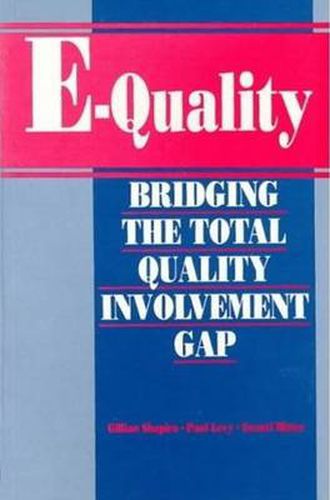Readings Newsletter
Become a Readings Member to make your shopping experience even easier.
Sign in or sign up for free!
You’re not far away from qualifying for FREE standard shipping within Australia
You’ve qualified for FREE standard shipping within Australia
The cart is loading…






Focusing on the European telecommunications sector, which holds a vital strategic position in an economy that relies on information-processing activities, this book highlights the largely untapped skills and potential contribution women employees can make to total quality programmes. It explains how the principle of equality-driven total quality can be extended to encompass the full diversity of a workforce, and how the principles involved can be applied to other industrial sectors. This textbook makes the link between total quality management success and equality. A commonality is demonstrated between the goals of equal opportunities and TQM through the development of equality-driven involvement. Equality objectives are likely to be more effectively implemented if synchronized with overall organizational strategic objectives. Conversely, organizations adopting TQM need to place a greater emphasis on issues of involvement, which recognize the diversity of the workforce. Without integrating the philosophies of equality and total quality, it is difficult to generate consistent levels of involvement throughout the workforce. Such involvement is fundamental to the people-driven aspect of a successful TQM programme. The focus on the involvement gap heralds a new approach and way forward for industrialists and academics to bridge company TQM and equal opportunity programmes with workforce reality. In a recent survey of British manufacturers, TQM techniques were shown to be used by over 90 per cent of the respondents. Yet, few companies adopting TQM are achieving their desired goals. Lack of employeee involvement, a prerequisite of successful TQM, has been highlighted as a potential reason for this shortfall. This book explains the direct link between equality and quality in the context of employee involvement and commercial objectives. Swasti Mitter is the author of Employment Implications of New Technologies for Women .
$9.00 standard shipping within Australia
FREE standard shipping within Australia for orders over $100.00
Express & International shipping calculated at checkout
Focusing on the European telecommunications sector, which holds a vital strategic position in an economy that relies on information-processing activities, this book highlights the largely untapped skills and potential contribution women employees can make to total quality programmes. It explains how the principle of equality-driven total quality can be extended to encompass the full diversity of a workforce, and how the principles involved can be applied to other industrial sectors. This textbook makes the link between total quality management success and equality. A commonality is demonstrated between the goals of equal opportunities and TQM through the development of equality-driven involvement. Equality objectives are likely to be more effectively implemented if synchronized with overall organizational strategic objectives. Conversely, organizations adopting TQM need to place a greater emphasis on issues of involvement, which recognize the diversity of the workforce. Without integrating the philosophies of equality and total quality, it is difficult to generate consistent levels of involvement throughout the workforce. Such involvement is fundamental to the people-driven aspect of a successful TQM programme. The focus on the involvement gap heralds a new approach and way forward for industrialists and academics to bridge company TQM and equal opportunity programmes with workforce reality. In a recent survey of British manufacturers, TQM techniques were shown to be used by over 90 per cent of the respondents. Yet, few companies adopting TQM are achieving their desired goals. Lack of employeee involvement, a prerequisite of successful TQM, has been highlighted as a potential reason for this shortfall. This book explains the direct link between equality and quality in the context of employee involvement and commercial objectives. Swasti Mitter is the author of Employment Implications of New Technologies for Women .